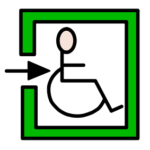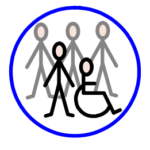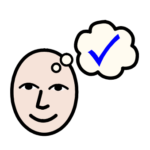Click on a word which is in blue and bold to read what it means.


This year Inclusion Europe wants to talk about education.
We think that inclusive education is better for students,
teachers and parents.
We created the ABCs of inclusive education to
help you understand what inclusive education is.

“A” such as: Accessibility
The right to accessibility and reasonable accommodations guarantee
to all students with disabilities the right to attend schools on an equal basis to others.

“B” such as: Be part of the community
With inclusive education, all students can
be part of their community.

“C” such as: Cooperation
In an inclusive school, students are taught in small classes
in which they collaborate and support one another
rather than compete.

“D” such as: Diversity
In an inclusive education system,
there is a diversity of students.
There are students with and without disabilities
that learn in the same classroom.

“E” such as: Everyone
Everyone has the rights to learn.
“F” such as: Flexible learning
In an inclusive school, the teaching methods must meet
the individual needs of all learners.
To do so, the teachers use easy and creative approach
to education and curriculum.

“G” such as: Growing
Inclusion has no limits.
It is constantly evolving and growing.

“H” such as: Health
People with disabilities who have been
included in school are healthier.

“I” such as: Invest in inclusive early childhood care and education
One of the steps towards achieving inclusive education is
to put money, effort and time into
inclusive early childhood care and education.

“J” such as: social Justice
Inclusive education gives support and opportunities to
people with disabilities.
Inclusive education helps to create a society where
people with disabilities are not stigmatised.
“K” such as: Keep an open mind
In an inclusive education, the teachers must
keep an open mind and recognise different learning styles.

“L” such as: Legislative framework
It is necessary to create laws
that promote the right to access inclusive education for all.
This includes the respect of
the UN CRPD and the Convention on the Rights of the Child.

“M” such as: Ministry
To achieve inclusive education,
one ministry must be responsible for
educating all students of the same age and level of education.

“N” such as: Individual needs
An inclusive education system responds to
the needs of every child without discrimination.
“O” such as: Opportunities
Inclusive education provides all students with
equitable learning opportunities
within the regular school system.

“P” such as: Physical accommodation
Inclusive education is also about physical accommodations.
For example:
- ramps instead of stairs,
- doorways wide enough for wheelchair users.

“Q” such as: Quality education
The UN CRPD Committee says that
“inclusive education is central to achieving high-quality education for
all learners, including those with disabilities.”

“R” such as: Resources
In an inclusive education system, schools must have
access to the financial and human resources to support inclusion.
It means that schools need money and people to help
implementing inclusion in classrooms.

“S” such as : no Segregation
Inclusion involves ending segregation.
Segregation occurs when people with disabilities are educated in separate environments (classes or schools) designed for students with disabilities.

“T” such as: Trained teachers
In an inclusive education system, teachers are trained and supported
on how to individualise their teaching.
They use different methods for different learning style
so that all students can learn.

“U” such as: Understanding
Inclusive classrooms foster attitudes of understanding and empathy.
Inclusive education also helps change
discriminatory attitudes and change stigmas around disabilities.
V: Valuate other perspectives
Inclusive schools place great importance on creating opportunities for students to learn in a variety of ways.
That is why teachers in inclusive schools must consider
a wide range of learning modalities:
- visual: videos, illustrations, written instructions, graphic organizers;
- auditory: verbal instructions, music, audiobooks;
- kinaesthetic: games, role-playing, hands-on activities.

W: Work together
Inclusive education allows learners with and without disabilities to
attend the same age-appropriate classroom.

X: eXtra benefits
Learners with disabilities who have been included in school:
- Perform better in highly inclusive settings;
- Are more likely to look forward to going to school;
- Are more likely to be included and participate in their communities after graduation;
- Are more likely to have employment and access to recreational activities.

Y: Yearn for more
Parents, students with intellectual disabilities, self-advocates, teachers, and NGOs have been fighting for inclusive education for many years.
Inclusion Europe will keep fighting until
we make sure all learners with intellectual disabilities
have access to quality education!


Z: “Zero reject policy”
To achieve inclusive education, we need to eliminate
laws that exclude children from school based on disability.
This is something called “Zero reject policy”.
It is the principle according which
no student with a disability can be denied an education.
Join our campaign “That’s what I learned”
on inclusive education!
To read more about Education
click here.





